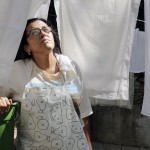According to interviews with 77-year-old Ken Loach, Jimmy’s Hall, one of two British films accepted for competition in Cannes this year, is his last major feature film. It is a fitting swan song, not only because it takes up many of the issues at the heart of his films since Poor Cow in 1967; but because it echoes the left-wing politics, style of filming, way of working with actors, and long time collaboration with writer Paul Laverty that have characterised his work.
That the only man ever banished from Ireland without a trial was a socialist guilty of no more than running a dance and crafts club, is clearly a story Loach, and Laverty, who discovered the story, could not resist. Jimmy’s Hall is both a powerful, absorbing bit of history and an excuse for some more relentless, if well deserved, Conservative, British military and Catholic Church bashing.
Opening titles tell us that this shameful episode took place between 1921 (the end of a three-year Civil War Ireland) and 1933, when Ireland was suffering from the Depression and abject poverty. When the film begins in 1932 Jimmy Gralton (Barry Ward) has just returned to County Leitrim after ten years in order to care for his widowed mother. The conservative government had been replaced with the theoretically left wing Fianna Fail and 45-year-old Jimmy, who had farmed, worked in the mines and in the US Navy, feels that his home county would now be safe.
The charismatic world traveller renews acquaintances with old friends, his now-married true love Oonagh (Simone Kirby) and meets the new parish priest, Father Sheridan (Jim Norton). He is also persuaded by a new generation to reopen the Pearse-Connolly Hall so the local youths can have a place to congregate, take courses and dance without freezing outdoors.
Jimmy may have changed in ten years, but his socialist convictions, shared by his supportive mother, have not. Deemed a dangerous communist by Father Sheridan, fascist estate owners and the conservative arm of the IRA, Jimmy soon finds himself battling to save the Hall – and himself – all over again.
A ’10 years earlier’ title takes us back to the origins of the Hall, built by Jimmy and the locals to offer the community art and music classes, dances, and the inevitable space for political meetings about land reform. Jimmy is reminded that music and dancing is sinful outside the confines of the church and that ‘education is the preserve of the Holy MotherChurch.’ When he disagrees, the hall is attacked by armed gunmen, and he flees to America. Through their tears, Oonagh (a fictitious character) declines his invitation to join him.
That all the dialogue, and many of the characters, even, to some extent, Jimmy, are fictional constructs, and that film is predictable, are not the problem. Jimmy’s Hall is a great David vs Goliath story of injustice, even with the outcome known. The problem is that the story is indistinguishable from a polemic, a socialist sermon to replace the Catholic sermons in the film that would be farcical if they were not so dangerously influential.
Loach and Laverty give vent to their own indignation through Jimmy’s two (obviously invented) cathartic speeches, one a rallying cry to restore a family evicted from their farm, and the other a confrontation with Sheridan. When Jimmy realises Sheridan will not compromise, he condemns priests who have ‘venom in their heart for everything they cannot control.
When Sheridan accuses Jimmy of sacrilege, he retorts: ‘You know what sacrilege is? Having more hate than love in your heart.’ In a final scene, whether to add some subtlety to the film or to brighten Jimmy’s halo, we see that Sheridan secretly respects and admires Jimmy.
Although we never really get to know Jimmy, Barry Ward is a convincingly likeable, vulnerable yet courageous and tragic hero, and pleasure to watch. You cannot fault the historic details, the production values, or the authentic setting (the film was shot in situ), but it amounts to a lot of preaching for a weekday or Saturday night.
Joyce Glasser – MT film reviewer




